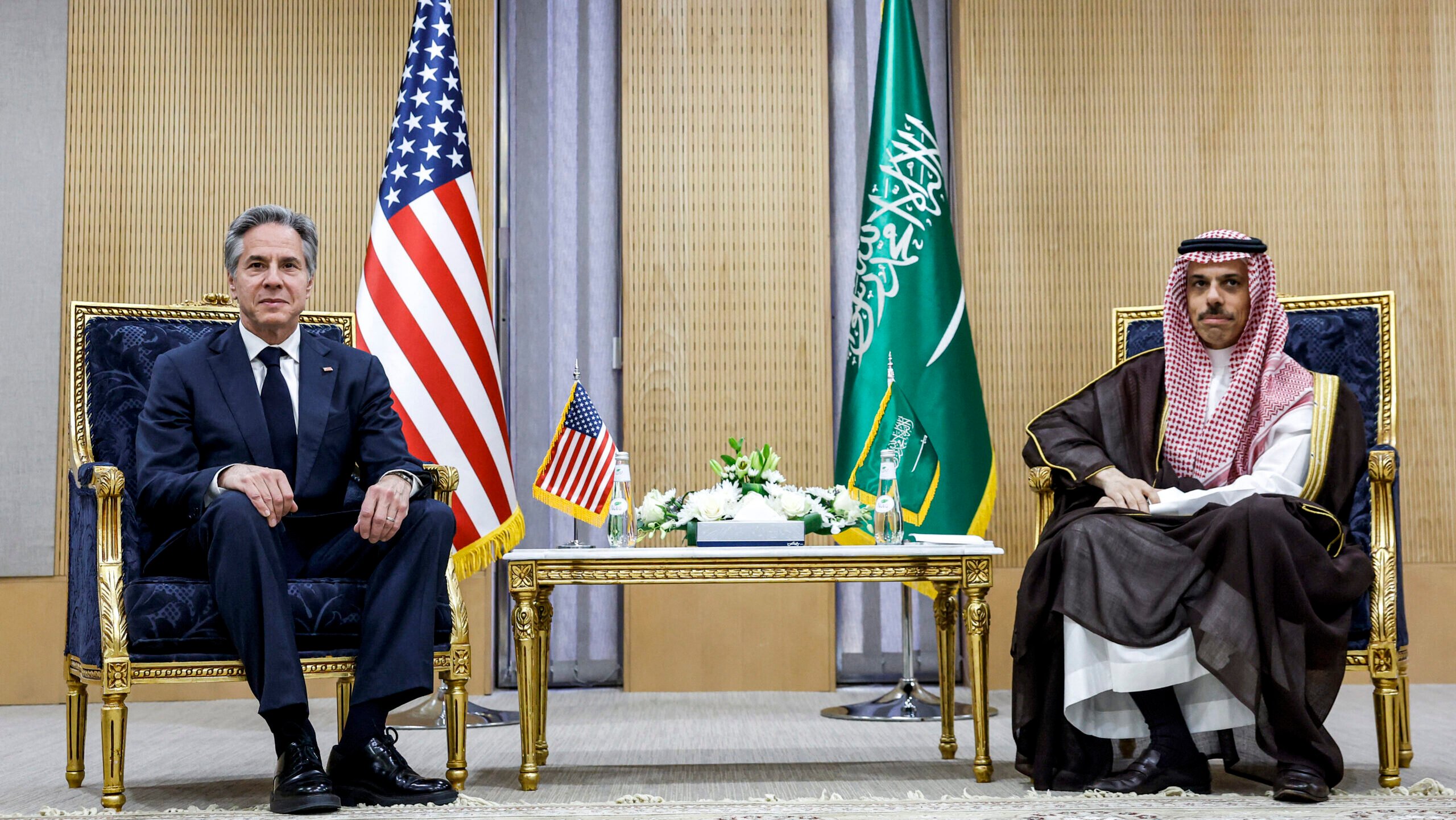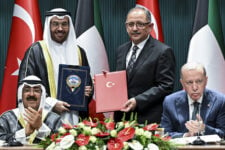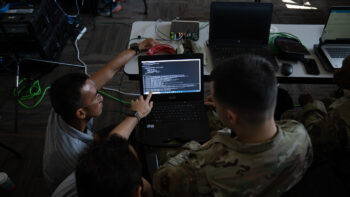
TOPSHOT – Saudi Arabia’s Foreign Minister Prince Faisal bin Farhan (R) receives US Secretary of State Antony Blinken at the Gulf Cooperation Council (GCC) Secretariat in Riyadh on April 29, 2024. (Photo by EVELYN HOCKSTEIN / POOL / AFP) (Photo by EVELYN HOCKSTEIN/POOL/AFP via Getty Images)
BEIRUT — On April 29, US Secretary of State Anthony Blinken made a surprising announcement: that a new defense pact between the United States and the Kingdom of Saudi Arabia is “potentially very close to completion.” In turn, Saudi foreign minister Prince Faisal bin Farhan said that bilateral agreements between the two sides are expected “in the near future.”
The statements sent media in the region scrambling to announce that the two sides were effectively done crafting a defense agreement that Riyadh has long sought from Washington. But the reality, according to experts, is that any deal is still a long way away.
While it seems evident that negotiations are ongoing, there are two large hurdles still to be cleared: what Riyadh is expected to demand from the US, and a counter-demand from Washington that such an agreement be twinned with Israeli-Saudi normalization.
“This whole conversation is a non-starter. I’m not sure why it’s been floated around as if they’re incredibly close,” said Bilal Saab, associate Fellow at Chatham House, summing up the general tone from five analysts who discussed the issue with Breaking Defense.
Jon Alterman, head of the Middle East Program at CSIS, added that despite the official statements, “it is unlikely for there to be a comprehensive US Saudi agreement in the coming months.”
What Riyadh Wants From Washington
The first issue is the question of what a US-Saudi defense pact would look like. Officially, little has been said about what shape that could take.
Asked about the potential for such a pact, a State department official told Breaking Defense that, “the long-term goal of a more peaceful, stable, prosperous, and integrated Middle East region remains a focus of U.S. foreign policy. We continue to have conversations on these issues, to include on the need for a sustainable peace between the Israelis and Palestinians. Our immediate focus remains on securing the release of hostages and an immediate ceasefire in Gaza.”
Ali Bakir, professor at Qatar University and non-resident senior fellow at the Atlantic Council’s Scowcroft Middle East Security Initiative, described a potential deal with Saudi Arabia as “vague and general.”
“Based on publicly available information, the deal appears to involve offering Riyadh a defense pact similar to the one the US has with South Korea, where Washington would be committed to defending Saudi territorial sovereignty against external threats, but it would stop short of the mutual defense guarantee enshrined in NATO’s Article 5,” Bakir said.
He added that “such a limited defense proposal falls short of Saudi Arabia’s demands and may not be well-suited to the complex security environment of the Middle East, where non-state and semi-state armed actors play a significant role and traditional deterrence dynamics and calculations are not so effective.”
Kristian Alexander, head of the International Security and Terrorism Program at Trends Research & Advisory think tank based in the UAE, said that according to such a defense pact, “the US would provide security guarantees to Saudi Arabia, which might include commitments to defend the kingdom in the event of external threats. The agreement could also allow Saudi Arabia access to sophisticated U.S. military technology that was previously restricted, which could significantly enhance the kingdom’s defense capabilities.”
On the US side, Alterman told Breaking Defense that Washington would be asking for “constraints on engagements with China” as part of the deal.
According to Bloomberg, Crown Prince Mohammed bin Salman would “limit Chinese technology from his nation’s most sensitive networks in exchange for major US investments in artificial intelligence and quantum-computing, and get American help to build out its civilian nuclear program.”
Another issue raised by analysts is logistical: The US doesn’t easily create formal defense agreements, and the Saudis will want something written in stone.
“The United States doesn’t have defense pacts with a lot of countries. It has mutual defense pacts with countries in NATO. But the idea of a written defense pact is not something the United States normally gives nor does it give [easily] because it means that there’s a possibility that Americans will die in accordance with the requirements of the pact, and that requires a lot on the other side,” Alterman said.
He added that “Saudis want as close as they can get to written US agreement to defend the Kingdom under a variety of circumstances,” but with so little detail revealed it is unclear what those circumstances are.
Alexander agreed, noting that any defense pact with KSA “will very likely also raise concerns among some US lawmakers (US Senate and Congressional Approval), who view the Saudi government as an untrustworthy partner and are critical of its human rights record and involvement in the Yemen conflict.”
And if Congress won’t endorse a formal pact — something that is hard to see given the polarization in DC around Saudi Arabia — the White House “might have to go the executive route,” which is “going to be looked at, especially by adversaries [like] Iran, as a weaker form of security guarantee, which frankly, goes against the wishes of the Saudis,” Saab highlighted.
Israel-Saudi Normalization Seems Far Away
Which leads into the second, and perhaps largest, obstacle: the reliance of any defense pact between US and KSA on the Saudi normalization with Israel.
Said Saab, “They may be close in terms of negotiating the details and the contours of [a] defense pact but nevertheless, the number one condition remains which is normalization with Israel and the one country that is holding that up, of course, is Israel itself.”
While reportedly Riyadh and Washington might have drafted a plan B for a bilateral defense pact that doesn’t depend on normalization with Israel, US officials have, at least in public, stressed that no defense pact will happen without normalization.
With the Gaza conflict raging and Israeli Prime Minister Benjamin Netanyahu seemingly becoming more bellicose in tone, making declarations that Israel will prosecute its war with or without American support, getting the Saudis and Israelis on the same page seems a tall task.
“A key condition for Israel to enter into such an agreement involves ending the conflict in Gaza and taking steps towards establishing a Palestinian state, which are substantial political challenges given the current Israeli government’s stance,” Alexander said.
Bakir concurred, noting that “Netanyahu has recently rejected the two-state solution and is refusing to agree to a deal that would halt the Israeli war on Gaza and establish a permanent ceasefire — both of which were central to Saudi Arabia’s proposal for potential normalization with Israel.”
Given all that, why make the announcement that Blinken did? Andreas Krieg, CEO of MENA Analytica, a London-based strategic risk consultancy firm focusing on the wider Middle East region, said that “It looks very much like a desperate attempt to create a consensus around something [at a time of chaos in the region], when in reality, we’re still very, very far away because it requires a couple of conditions to be met that are currently not met.”
In his opinion, Krieg said that “US officials are trying to create some buzz around the story [defense pact] because they need a foreign policy … vis-a-vis their electorate as they’re going into elections. And so they’re trying to create a narrative that they’re strongly working towards a ceasefire in Gaza, that they’re trying to create a new framework for the Middle East security that would allow Gulf states to pivot away from China and Russia closer to the United States.”
However, there may be some strategy there, said Bakir. He notes that getting a bilateral deal with Riyadh worked out first would give the Biden administration a carrot to dangle in order to push normalization with Israel.
Added Alexander, “While the proposed pact could set a foundation for normalization between Saudi Arabia and Israel, actual normalization would require sustained diplomatic efforts, significant political compromises, particularly concerning the Palestinian issue, and a conducive regional environment.
“The agreement, therefore, represents a starting point rather than a conclusive solution to these complex regional dynamics,” Alexander said.
With back-to-back deals in Peru, South Korea defense industry expands South American foothold
A new shipbuilding deal could be a test case that, if successful, could lead for years more work and millions more in deals for Seoul, in Peru and South America.


























